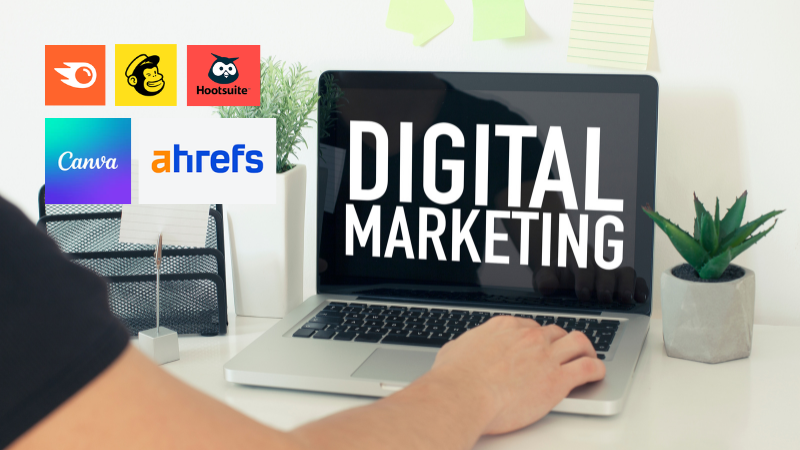In today’s fast-paced digital age, staying competitive means staying equipped. As the online marketplace becomes increasingly saturated, digital marketers, small business owners, and marketing enthusiasts must leverage powerful tools to stay ahead. The best digital marketing tools every marketer should use in 2025 are no longer just nice-to-haves—they’re essential for success.
From automating repetitive tasks to uncovering deep insights from data, these tools help optimize marketing campaigns, save valuable time, and boost return on investment (ROI). With ever-evolving trends, such as AI-powered analytics and hyper-personalized content, having the right set of tools can make all the difference between a thriving brand and a struggling one.
In this guide, we’ll explore the best digital marketing tools every marketer should use to streamline workflows, stay relevant, and supercharge their strategies in 2025.
Why Digital Marketing Tools Matter
Digital marketing tools are the backbone of modern marketing strategies. They empower marketers to work smarter, not harder, by simplifying complex processes like data analysis, content distribution, and performance tracking.
Key Reasons These Tools Are Vital:
- Automation: Marketing automation tools reduce manual workload, freeing up time for strategic planning and creativity.
- Data-Driven Decisions: With real-time insights, marketers can fine-tune their campaigns for better engagement and conversion rates.
- Efficiency: Online marketing tools enhance productivity by centralizing campaign management and communication.
The digital landscape is evolving rapidly. According to Gartner, over 63% of marketers in 2025 are expected to integrate AI-driven solutions into their workflows. Whether it’s chatbots, predictive analytics, or personalization engines, digital marketing software continues to reshape how brands interact with audiences.
By using reliable digital marketing tools, marketers not only gain a competitive edge but also position themselves to adapt quickly to future trends and consumer behavior shifts.
Categories of Digital Marketing Tools
Understanding the main categories of digital marketing tools helps marketers choose the right solutions for their unique goals. Each category addresses different stages of the marketing funnel and streamlines specific tasks.
1. SEO Tools
- Purpose: Improve search engine visibility, track keyword rankings, and analyze backlinks.
- Examples: Ahrefs, SEMrush, Moz.
- Tasks Streamlined: On-page audits, competitor analysis, keyword research.
2. Content Marketing Tools
- Purpose: Create, manage, and distribute engaging content.
- Examples: Canva, Grammarly, Trello.
- Tasks Streamlined: Editorial calendar planning, content optimization, graphic design.
3. Social Media Management Tools
- Purpose: Schedule posts, track engagement, and analyze performance across platforms.
- Examples: Hootsuite, Buffer.
- Tasks Streamlined: Cross-platform scheduling, audience insights, performance tracking.
4. Email Marketing Software
- Purpose: Build, send, and monitor email campaigns.
- Examples: Mailchimp, ConvertKit.
- Tasks Streamlined: Newsletter automation, A/B testing, subscriber segmentation.
5. Analytics Tools
- Purpose: Measure website traffic, conversion rates, and user behavior.
- Examples: Google Analytics, Hotjar.
- Tasks Streamlined: Traffic analysis, goal tracking, behavior flow mapping.
6. Advertising Tools
- Purpose: Plan, execute, and optimize digital ads.
- Examples: Google Ads, Meta Ads Manager.
- Tasks Streamlined: Ad targeting, performance monitoring, ROI calculation.
By categorizing and understanding the function of each tool, marketers can build a custom digital marketing toolkit tailored to their strategy.
Top Digital Marketing Tools to Use in 2025
Let’s dive into the best digital marketing tools every marketer should use this year. These platforms are widely adopted for their performance, scalability, and ease of use.
1. Google Analytics 4
- Features: Real-time traffic insights, cross-platform tracking, predictive metrics.
- Benefits: Helps marketers understand user behavior and optimize website performance.
- Pricing: Free.
- Use Case: A small business tracks which blog posts generate the most leads and adjusts its content strategy accordingly.
- Keyword Usage: One of the best digital marketing tools every marketer should use for tracking ROI and performance metrics.
2. SEMrush
- Features: Keyword research, SEO audit, competitor analysis.
- Benefits: Streamlines SEO efforts and content marketing planning.
- Pricing: Freemium with premium plans starting at $129.95/month.
- Use Case: A SaaS company uses SEMrush to uncover competitor backlinks and replicate high-performing strategies.
3. Mailchimp
- Features: Email templates, automation, A/B testing.
- Benefits: Enables email marketing at scale with personalization.
- Pricing: Free for up to 500 contacts, paid plans from $13/month.
- Use Case: An eCommerce store uses Mailchimp to recover abandoned carts via automated email sequences.
4. Hootsuite
- Features: Social media scheduling, analytics, team collaboration.
- Benefits: Centralizes social media management and saves hours of manual work.
- Pricing: Plans start at $99/month.
- Use Case: A content team schedules a month’s worth of social posts in one sitting.
5. Canva
- Features: Drag-and-drop design, brand kits, templates.
- Benefits: Makes professional content creation accessible to non-designers.
- Pricing: Free, Pro version at $14.99/month.
- Use Case: A solo marketer creates branded infographics for LinkedIn to boost engagement.
6. HubSpot
- Features: CRM, marketing automation, content management.
- Benefits: All-in-one platform for scaling digital campaigns.
- Pricing: Free CRM, marketing tools from $20/month.
- Use Case: A startup automates its entire lead nurturing process through HubSpot.
7. Ahrefs
- Features: Site audit, backlink checker, keyword explorer.
- Benefits: Offers deep SEO insights and competitor tracking.
- Pricing: Plans start at $99/month.
- Use Case: A blogger finds low-competition keywords to increase organic traffic by 150%.
8. Buffer
- Features: Post scheduling, analytics, engagement tools.
- Benefits: Helps small teams manage multiple social media accounts with ease.
- Pricing: Free for limited use, paid plans start at $6/month.
- Use Case: A freelancer maintains consistent posting across five client accounts.
9. Google Ads
- Features: Campaign creation, targeting, conversion tracking.
- Benefits: Drives targeted traffic with measurable ROI.
- Pricing: Pay-per-click.
- Use Case: A local business runs geo-targeted ads to promote seasonal sales.
10. Trello
- Features: Visual task boards, automation rules, collaboration.
- Benefits: Organizes content calendars and campaign tasks in one place.
- Pricing: Free, Business Class from $10/month.
- Use Case: A marketing team tracks campaign progress using Trello boards synced with deadlines.
These tools are not only powerful but represent the best digital marketing tools every marketer should use to future-proof their strategy.
How to Choose the Right Tools for Your Needs
Selecting the right marketing tools can be overwhelming, but a few key factors can guide your decision:
1. Define Your Budget
- Start with free or freemium plans and scale as needed.
- Prioritize cost-effective tools with high ROI potential.
2. Consider Team Size
- Solo marketers might prefer all-in-one platforms.
- Larger teams benefit from specialized tools with collaboration features.
3. Align with Marketing Goals
- Need more traffic? Focus on SEO tools.
- Prioritizing engagement? Opt for social media tools.
4. Evaluate Integrations and Scalability
- Ensure tools integrate with your CRM or email provider.
- Look for marketing solutions that can grow with your business.
Choosing the right mix is about balancing features, usability, and future growth—an essential part of smart marketing tool selection.
Conclusion: Best Digital Marketing Tools Every Marketer Should Use
In the digital-first world of 2025, marketers can no longer afford to go without a solid arsenal of tools. From automation and analytics to SEO and social media, the best digital marketing tools every marketer should use are designed to maximize efficiency and ROI.
Whether you’re a small business owner experimenting with campaigns or a seasoned marketer fine-tuning strategy, the key lies in finding tools that align with your goals. Start with free trials, experiment with integrations, and discover what works best for your workflow.


Add a Comment